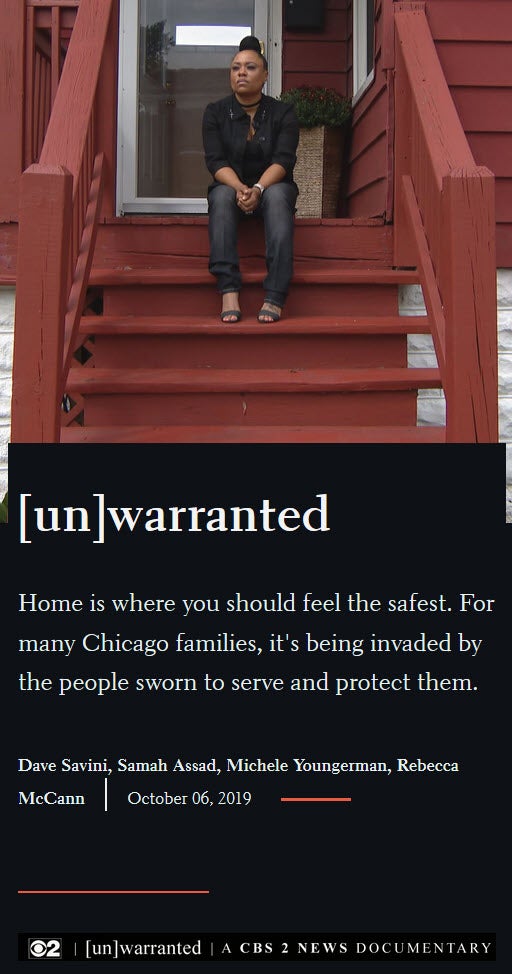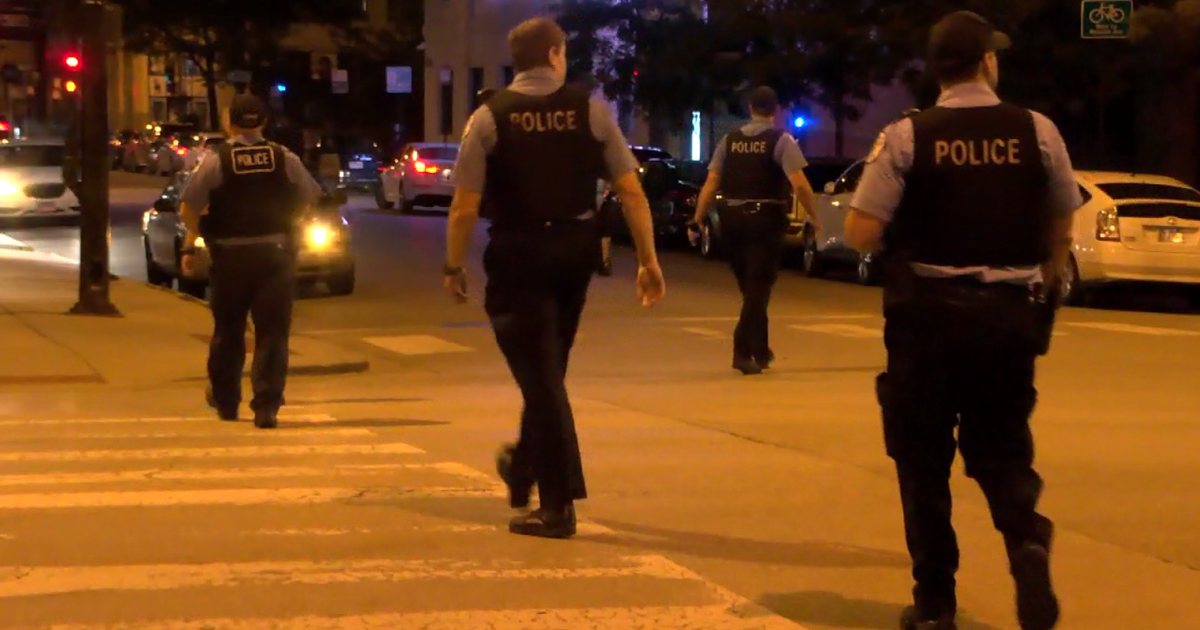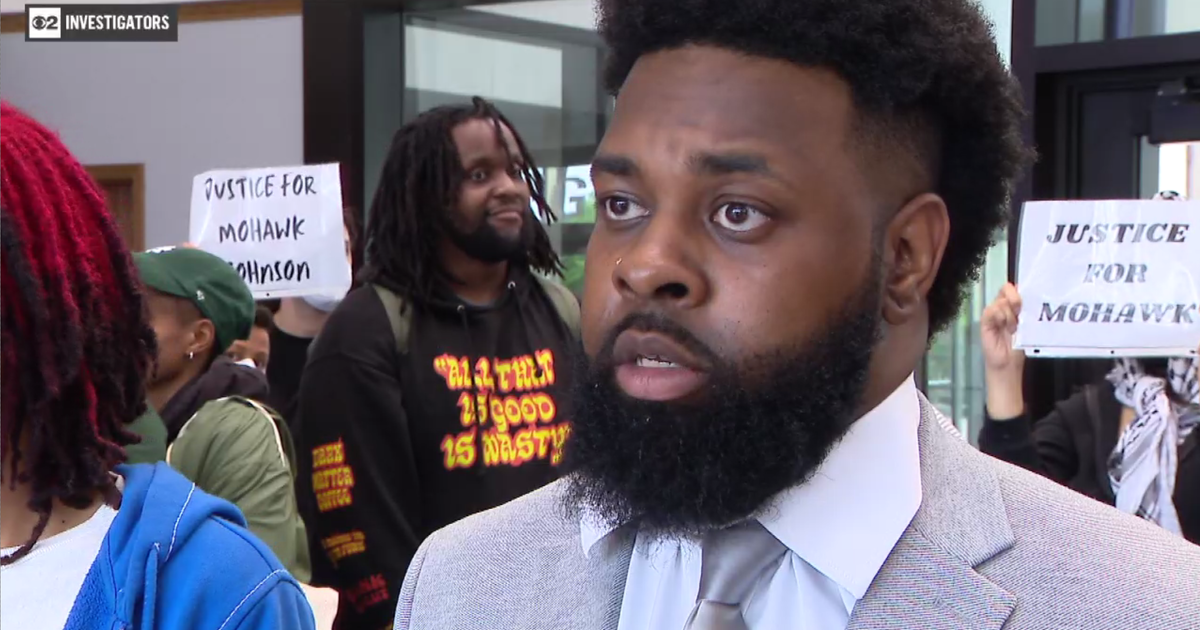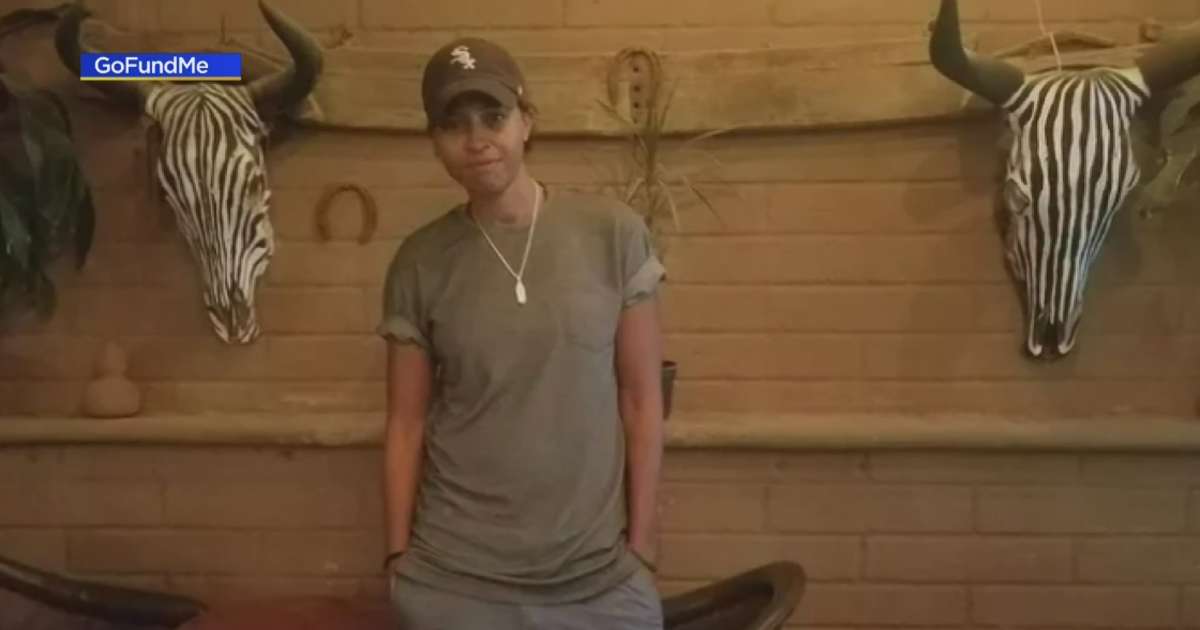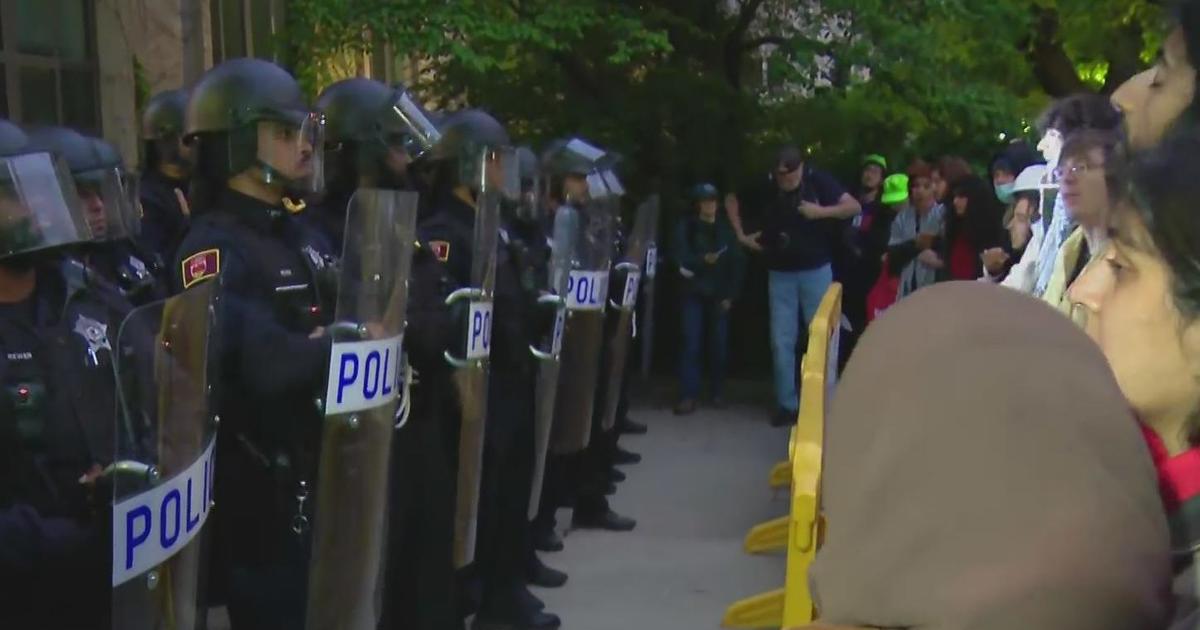Chicago Police Supt. Eddie Johnson Confirms He's Retiring At The End Of The Year; 'It's Time For Someone Else To Pin These Four Stars To Their Shoulders'
by Todd Feurer, CBS Chicago web producer
CHICAGO (CBS) -- Chicago Police Supt. Eddie Johnson will be stepping down at the end of the year, amid an inspector general's investigation into the incident in which he was found slumped over in his Chevy Tahoe after he'd been drinking at a dinner with friends last month.
"It's time for someone else to pin these four stars to their shoulders. These stars can sometimes feel like carrying the weight of the world, but I'm confident that I leave CPD in a better place than when I became superintendent," Johnson said at police headquarters Thursday morning.
"I'd be disingenuous if I didn't say this job has taken its toll; it's taken a toll on my health, my family, and my friends, but my integrity remains intact, and I'm proud of what the department has accomplished in my tenure," he added.
On Thursday night, Johnson spoke further about his decision at the University of Chicago Institute of Politics.
"I love this department, so it's not easy. But mentally, I'm in a good place," Johnson said.
Mayor Lori Lightfoot said Johnson has agreed to stay in his post through the end of the year, while she launches the process of selecting his successor.
"He continues to have my unwavering confidence and support," Lightfoot said. "It's not easy to leave a career you love, or end your service to the only city you've considered home."
Johnson, 59, said the ongoing investigation into him being found slumped over in his car after he'd been drinking at dinner last month had nothing to do with his decision to retire.
"I've been doing this 31 years. It's time. 2020 will be a new year and a new chapter in my life, and I'm looking forward to it. I am so at peace, mentally, with everything," he said.
Johnson also noted his wife, Chicago Police Lt. Nakia Fenner, has been urging him to retire for a while, given his health concerns. Johnson underwent a kidney transplant two years ago, and also has had issues with his blood pressure.
"I've had some health challenges that I've had to deal with. So I just think it's in my best interest to do this at this point. I'm just ready. This is my decision, and I'm just ready," Johnson said.
Johnson and Lightfoot declined to comment on the ongoing investigation of the superintendent, including whether or not he's been questioned or subpoenaed by Inspector General Joseph Ferguson.
The mayor said it would be improper for them to comment on the investigation at this point.
"The investigation has to be independent. The investigation cannot be influenced by anything that I say," she said. "The reality is the investigation is going to take the normal course. The investigation, I'm sure, because it's the inspector general, will be very thorough, but it's inappropriate for us to talk about anything related to the investigation, because he's going to be a witness, I'm going to be a witness."
The mayor did not name an interim superintendent to temporarily replace Johnson, saying she wanted to focus first on honoring his tenure as the city's top cop.
"I will be more than happy to talk to you at another time about what the next steps are going to look like," she said.
For his part, Johnson declined to weigh in on who should be the city's next top cop, saying it was up to Lightfoot to decide.
"I just think it should be someone that wants to lead this city and this department in the right direction, and keep the momentum going that we have,"
A source inside Johnson's closed-door farewell to his command staff described it to CBS 2's Brad Edwards as "just a good gentleman saying goodbye."
Johnson noted he took command of the department at a tumultuous time, when public trust in the department had all but shattered in the wake of the release of video showing the fatal shooting of 17-year-old Laquan McDonald.
"Trust in the police department fell to its lowest that I've seen in my 31 years. Officer morale bottomed out, and likely because a result of the lack of trust that the community had in us," Johnson said.
Murders spiked to 20-year highs in 2016 as Johnson took the reins at CPD, but the superintendent said he was proud that murders, shootings, and other crime have steadily declined under his watch.
"Some experts predicted that Chicago would only get worse, but I knew we could do better, we just had to do things a little bit differently," he said.
Johnson pointed to efforts to hire new officers, increase its use of technology such as gunshot detectors to more quickly respond to shootings, and to overhauling its use of force policy to emphasize de-escalation tactics.
"I've had my doubts sometimes about our strategies, but the numbers tell us that what we've been doing is working," he said.
Since he took office in 2016, murders and shootings have declined for three straight years. Year-to-date, murders in 2019 are down 30% compared to 2016.
One accomplishment the superintendent said he was especially proud of during his time in office was a major reduction in police-involved shootings. He said, at this point in 2011, there had been 91 police-involved shootings, compared to only 16 so far this year.
With Johnson now leaving his as the city's top cop, Lightfoot and the Chicago Police Board will begin the process of finding a permanent replacement. The board is tasked with conducting a search and nominating candidates for the top job. The mayor could then choose one of those finalists and seek City Council confirmation of her choice, or ask the board to go back to the drawing board.
RELATED: How Will The Chicago's Next Police Superintendent Be Chosen?
The mayor has disputed a report that she is scheduled to meet Friday with former Los Angeles Police Department Chief Charlie Beck about taking over for Johnson after he steps down.
Johnson's retirement comes as the Chicago Inspector General's office is investigating into an incident in which he was found slumped over in his car after he'd been drinking with friends at dinner. However, Johnson has said he's not worried about the investigation, and claimed it was not a factor in why he's been thinking of retiring.
He was found asleep behind the wheel of his SUV early on Oct. 17, after he had gone out for dinner with a group of friends the night before. Speaking before a Police Board meeting the evening after the incident, Johnson blamed the incident on a mix-up in which he failed to take his blood pressure medication, and a feeling that he might faint that prompted him to pull over and rest.
Lightfoot later told the Sun-Times that Johnson had admitted to her in a phone call that he'd had "a couple of drinks with dinner" that night. However, the superintendent made no mention of drinking when he spoke about the incident publicly, and officers who responded to the scene of the incident did not perform a sobriety test on Johnson.
A woman who had seen Johnson slumped over in his SUV had called 911 to report someone sleeping at a stop sign, according to CPD spokesman Anthony Guglielmi. When officers arrived at the scene, they did not see any signs of impairment, and let their boss drive home without administering a field sobriety test.
Johnson said he fell asleep when he pulled over. He has said he would have been better off having a driver with him after going out for dinner the night of the incident, but both he and his usual driver had already worked all day and he sent his driver home.
The superintendent added that he had visited his cardiologist twice in the days before the incident to follow up on a blood clot that he experienced this summer, and his doctor had changed his blood pressure medication. Johnson said he inadvertently forgot to take his new medication on the day of the incident, after throwing out his old medicine.
Hours after the incident, Johnson requested an investigation by the Internal Affairs Division, citing the need for transparency. Chicago Inspector General Joseph Ferguson later took over the investigation. Just days after the incident, the mayor had said Johnson would remain in his job until the investigation is complete.
The Chicago Police Department has denied Freedom of Information requests for all body camera and dashboard camera footage of the incident, citing the open investigation.
Lightfoot has said Johnson called her to tell her what happened, but she declined to say whether she believed it was proper for Johnson to be allowed to drive himself home.
"There's an investigation that will sort out the specifics, but I'm going by what he informed me of," the mayor said. "We've all had moments where we've been driving, and we might have felt something. I think he took what he believed was the appropriate precaution based up on what he was feeling."
At the U of C event Thursday night, Johnson said of the occasion, "I actually can't comment on the specifics."
He went on, "But what I can say is I know what I felt that night, You know. You have to know yourself, and we had worked a long day - that day and the day before."
A 31-year veteran of the Chicago Police Department, Johnson began his career as a beat cop in 1988. He was named commander of the Gresham District in 2008, was appointed deputy chief of patrol in 2012, named chief of patrol in 2015, and was appointed superintendent in April 2016.
Johnson took the helm as superintendent after then-Mayor Rahm Emanuel passed over three finalists selected by the Chicago Police Board, and personally hand-picked Johnson to replace former Supt. Garry McCarthy, whom Emanuel fired in the fallout from the fatal shooting of Laquan McDonald.
Emanuel rejected the nominees the Police Board sent him in 2016, and instead appointed Johnson -- who didn't initially apply for the job -- without having the Police Board -- which Lightfoot chaired at the time -- go through the hiring process a second time, as normally required. Instead, Johnson and the City Council temporarily changed the rules to put Johnson in the job.
Lightfoot said she has no intention of bypassing the Police Board to pick Johnson's replacement.
"The Police Board process is mandated, by law. I'm not going to violate the law," she said. "Having led the last search for a superintendent, I believe in respecting the law and the Police Board process. So when and if we get to that point, of course I will follow the law, and I will follow the Police Board process."
Johnson took over as superintendent at a tumultuous time for the department. Public trust in the department was in tatters after the release of video showing the shooting death of 17-year-old Laquan McDonald, morale at the department was "a mess," and murders in 2016 were surging to levels Chicago hadn't seen in 20 years.
However, since then homicides have steadily declined from 762 in 2016 to 660 in 2017, and 561 in 2018. Through the end of October this year, there were 424 murders in Chicago, compared to 478 for the first 10 months of 2018, according to data provided by CPD.
Shootings also have seen a sharp decline under Johnson's watch. According to the Police Department, a total of 4,351 people were shot in Chicago in 2016, a total of 3,463 were shot in 2017, and 2,940 were shot in 2018. Through the end of October, there were 2,242 shooting victims this year, compared to 2,462 in the first 10 months of 2018.
Spat With President Trump
Despite the drop in violent crime under his watch, President Donald Trump repeatedly criticized Johnson over the past week, after the superintendent skipped the president's speech at the International Association of Chiefs of Police conference. Johnson had said he would not attend Trump's speech "because the values of the people of Chicago are more important than anything that he would have to say."
"That's a very insulting statement after all I've done for the police, and I've done more than any other president's ever done for the police," Trump said. "Here's a man that could not bother to show up for a meeting of police chiefs, the most respected people in the country, in his hometown, and with the president of the United States, and you know why. It's because he's not doing his job."
Trump also lamented city's struggles with violent crime, noting there were 565 murders in Chicago in 2018, and more than 1,500 since Johnson took office in 2016.
"Under Johnson's leadership, they certainly don't protect people," Trump said.
Afterward, Johnson defended himself and the department, noting three consecutive years of reductions in crime, and pointing out the same officers Trump had criticized spent the entire day protecting him.
"Facts matter and everyone in this room knows that," Johnson said.
Days later, Trump again criticized Johnson in a tweet, without naming him directly, saying "Chicago will never stop its crime wave with the current Superintendent of Police."
Mayor Lori Lightfoot jumped to Johnson's defense, responding on Twitter that Johnson "has dedicated his career to public service."
"You only serve yourself. The crime wave you should be concerned about is the one you are perpetrating against the American people from the White House," the mayor wrote to Trump.
Johnson's decision to skip Trump's speech also drew the ire of the leadership of the Chicago Fraternal Order of Police. The police union's board of directors issued a vote of no confidence in Johnson to protest his decision not to attend the president's speech.
History Of Health Problems
Johnson has had a series of health issues since taking the top post at CPD. In June, he was treated for a small blood clot that was found in his lung during a routine test.
In August 2017, he received a kidney transplant from his son. He fainted at an awards ceremony a few days after returning to work that October, after suffering a blood pressure issue.
When he fell ill at the news conference 2017, spokesman said he had taken blood pressure medication on an empty stomach and felt sick, but the issue was not related to his kidney disease.
Johnson was diagnosed with kidney disease more than 30 years ago.
Meantime, Johnson's tenure hasn't been without its controversies before the incident in his car.
Laquan McDonald Shooting Video
Documents released by the Chicago Inspector General's office last month in connection to the fatal shooting of 17-year-old Laquan McDonald revealed Johnson took part in a meeting by several top brass to view video of Officer Jason Van Dyke shooting the teen 16 times. According to a police lieutenant who was at the meeting, "everyone in the meeting agreed the shooting was justified and that Van Dyke 'used the force necessary to eliminate the threat,'" and no one raised any concerns.
However, Johnson has denied the lieutenant's account of the meeting. Johnson said his role as a deputy chief at the time did not give him access to all of the information from the investigation into the shooting, and he was not involved in any decisions on discipline following the use of force, so it would have been
"To be clear, I never thought and I never said the shooting of Laquan McDonald was justified," he said days after the inspector general's report was released.
"Look at my record in terms of the Laquan McDonald incident and what I did, is that forgotten now?" he added. "No, when I became superintendent and was in a position to do something about it, I did that. So, my record speaks for itself."
Johnson recommended Van Dyke and 10 other officers be fired for their roles in the shooting and efforts to cover it up.
In July, the Chicago Police Board fired three officers and a sergeant for their roles in the coverup. Van Dyke and six other officers who faced firing either retired or resigned before the board could rule on their cases.
Recommendation To Fire Cop Who Shot Friend
Last month, Johnson recommended the Chicago Police Board fire Officer Patrick Kelly for shooting his friend, Michael LaPorta and lying about it. However, just last December, Johnson had said Kelly could not be fired over the 2010 shooting.
A report by the Civilian Office of Police Accountability (COPA) in September found that Kelly likely shot his friend Michael LaPorta after a night of drinking. COPA recommended the officer be fired.
A December 2018, response from Johnson says, "Officer Kelly and the Department settled and resolved all issues regarding the allegations arising from the shooting of [Michael LaPorta] ... and any further discipline is now barred by the prohibition against double punishment.
"As such the Department concurs with the factual findings with respect to the alleged conduct, but does not concur with COPA's recommended penalty of separation."
Johnson reversed his decision in October, and now the Chicago Police Board must hold evidentiary hearings before deciding whether to fire Kelly.
It has been a long fight for justice for LaPorta, who was shot in the head almost 10 years ago. Kelly reported it as a suicide attempt, and that's how police investigated.
The Independent Police Review Authority also investigated the case, and made seven allegations of misconduct against Kelly. Five were sustained, and Kelly was given a 60-day suspension related to alcohol issues from that night, but the questions of whether Kelly shot LaPorta and whether he gave false statements about it were not resolved until this year, after COPA – wich replaced IPRA – reinvestigated the case, and determined Kelly likely shot LaPorta.
Dispute Over Whether To Fire Officer Robert Rialmo
In March 2018, Johnson rejected a Civilian Office of Police Accountability report that recommended Officer Robert Rialmo be fired over the fatal shooting of 19-year-old Quintonio Legrier and 55-year-old Bettie Jones in 2015.
On the day after Christmas 2015, Rialmo and his partner were responding to calls about a domestic disturbance at LeGrier's father's home. Jones, who lived downstairs, opened the door and directed the officers to the apartment where LeGrier was staying with his father.
LeGrier, apparently suffering from mental health problems, came running down the stairs with a baseball bat. Rialmo fired eight shots, six of them hitting LeGrier, one of them hitting Jones, who was standing behind the teenager.
COPA had ruled Rialmo was not justified when he opened fire on LeGrier in the vestibule of a West Side home; killing him and Jones, an innocent bystander.
The agency recommended Rialmo be fired, but Johnson disagreed. Months later, Johnson reversed course, and the Chicago Police Board ultimately fired Rialmo last month.
Pattern Of Police Offices Raiding The Wrong Homes
Over the past year, the CBS 2 Investigators have uncovered a string of more than a dozen incidents in which police officers wrongly raided a family's home, and pointed guns at innocent adults and children, all based on bad information from confidential informants.
When a confidential informant gives officers information, such as tips on crimes, police are required to verify it's correct before acting. In the case of a search warrant, it must be signed by a police supervisor, an assistant state's attorney and a judge.
But Chicago police officers often fail to verify the address before executing search warrants, leading to the wrong homes - and innocent families - being the targets.
After reviewing thousands of police and court documents, watching hours of body worn camera footage and interviewing nearly more than two dozen family members and children, we uncovered a routine practice of police officers failing to verify information before raiding homes. And the department won't say what they're going to do about it.
Over the last year, CBS 2 has requested more than a dozen interviews with Superintendent Eddie Johnson to address the systemic failures we've uncovered, including:
- Officers' failure to verify information before executing search warrants.
- Officers repeatedly failing to wear or activate their body worn cameras during raids.
- Allegations of officers' misconduct once they enter the home.
- The city's lack of departmental discipline.
- What changes - if any - are being implemented.
Through a spokesperson, Johnson has denied each of our interview requests.
During a November 2018 news conference, CBS 2 Investigator Dave Savini questioned Johnson about wrong raids and the department's failure to comply with our Freedom of Information Act request for data on how often wrong raids happen. The department has yet to release complete records in response to CBS 2's FOIA request.
In response to CBS 2 stories on wrong raids, the department sent the following statement in the past:
"In all cases, CPD makes every effort to ensure the validity and accuracy of all information that is used to apply for and execute search warrants. Oftentimes this information comes from community sources and despite the vetting of material through a criminal court and the methodical process to authenticate addresses, errors can occur and we take them very seriously."
When CBS 2 requested a sit-down, one-on-one interview with Johnson for the "Unwarranted" documentary, Chief Communications Officer Anthony Guglielmi said Johnson does not have the time, and CBS 2's ratings aren't high enough, for him to do an interview.
